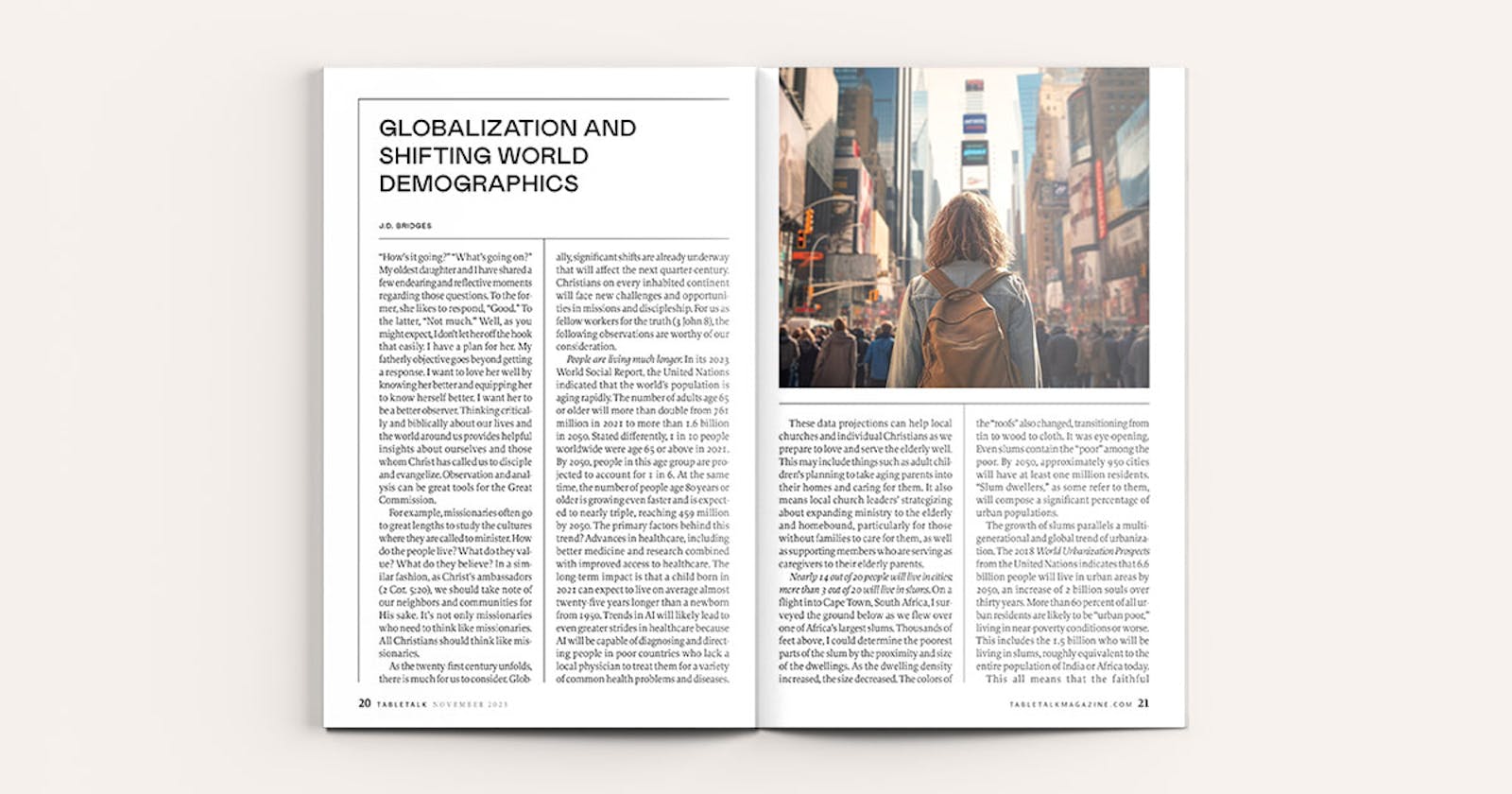
Request your free, three-month trial to Tabletalk magazine. You’ll receive the print issue monthly and gain immediate digital access to decades of archives. This trial is risk-free. No credit card required.
Try Tabletalk NowAlready receive Tabletalk magazine every month?
Verify your email address to gain unlimited access.
“How’s it going?” “What’s going on?” My oldest daughter and I have shared a few endearing and reflective moments regarding those questions. To the former, she likes to respond, “Good.” To the latter, “Not much.” Well, as you might expect, I don’t let her off the hook that easily. I have a plan for her. My fatherly objective goes beyond getting a response. I want to love her well by knowing her better and equipping her to know herself better. I want her to be a better observer. Thinking critically and biblically about our lives and the world around us provides helpful insights about ourselves and those whom Christ has called us to disciple and evangelize. Observation and analysis can be great tools for the Great Commission.
For example, missionaries often go to great lengths to study the cultures where they are called to minister. How do the people live? What do they value? What do they believe? In a similar fashion, as Christ’s ambassadors (2 Cor. 5:20), we should take note of our neighbors and communities for His sake. It’s not only missionaries who need to think like missionaries. All Christians should think like missionaries.
As the twenty-first century unfolds, there is much for us to consider. Globally, significant shifts are already underway that will affect the next quarter-century. Christians on every inhabited continent will face new challenges and opportunities in missions and discipleship. For us as fellow workers for the truth (3 John 8), the following observations are worthy of our consideration.
People are living much longer. In its 2023 World Social Report, the United Nations indicated that the world’s population is aging rapidly. The number of adults age 65 or older will more than double from 761 million in 2021 to more than 1.6 billion in 2050. Stated differently, 1 in 10 people worldwide were age 65 or above in 2021. By 2050, people in this age group are projected to account for 1 in 6. At the same time, the number of people age 80 years or older is growing even faster and is expected to nearly triple, reaching 459 million by 2050. The primary factors behind this trend? Advances in healthcare, including better medicine and research combined with improved access to healthcare. The long-term impact is that a child born in 2021 can expect to live on average almost twenty-five years longer than a newborn from 1950. Trends in AI will likely lead to even greater strides in healthcare because AI will be capable of diagnosing and directing people in poor countries who lack a local physician to treat them for a variety of common health problems and diseases.
These data projections can help local churches and individual Christians as we prepare to love and serve the elderly well. This may include things such as adult children’s planning to take aging parents into their homes and caring for them. It also means local church leaders’ strategizing about expanding ministry to the elderly and homebound, particularly for those without families to care for them, as well as supporting members who are serving as caregivers to their elderly parents.
Nearly 14 out of 20 people will live in cities; more than 3 out of 20 will live in slums. On a flight into Cape Town, South Africa, I surveyed the ground below as we flew over one of Africa’s largest slums. Thousands of feet above, I could determine the poorest parts of the slum by the proximity and size of the dwellings. As the dwelling density increased, the size decreased. The colors of the “roofs” also changed, transitioning from tin to wood to cloth. It was eye-opening. Even slums contain the “poor” among the poor. By 2050, approximately 950 cities will have at least one million residents. “Slum dwellers,” as some refer to them, will compose a significant percentage of urban populations.
The growth of slums parallels a multigenerational and global trend of urbanization. The 2018 World Urbanization Prospects from the United Nations indicates that 6.6 billion people will live in urban areas by 2050, an increase of 2 billion souls over thirty years. More than 60 percent of all urban residents are likely to be “urban poor,” living in near-poverty conditions or worse. This includes the 1.5 billion who will be living in slums, roughly equivalent to the entire population of India or Africa today.
This all means that the faithful proclamation of the gospel and the planting of biblically faithful churches in urban areas around the world will continue to be both a great need and a great opportunity as we seek to fulfill the Great Commission. It also means that caring for the poor must remain part of our faithful witness and service to Christ (see Prov. 19:17; Gal. 2:10).
One billion more people will use mobile phones by 2030. As I’ve traveled throughout some of the poorest regions and countries in Africa, I still marvel at the high percentage of people with cellphones. For example, after recently meeting Christian brothers living in the Sahara Desert of Mauritania, we exchanged contact information from our cellphones via WhatsApp. While I was in Nairobi, Kenya, a brother living in Africa’s largest slum shared his mobile number after Lord’s Day worship. In Tunisia, I met a brother who had learned English by watching Ligonier videos from his mobile device in a rural area of Gabon.

Those anecdotes correlate with a 2023 study by the Global System of Mobile Communications Association. It estimates that nearly three-fourths of the world’s population—roughly 6.3 billion souls—will have a mobile-device subscription by 2030. Compared to 2022, it’s an increase of nearly 1 billion, with approximately half expected from India and sub-Saharan Africa. Furthermore, more than 5.5 billion of those will have access to the internet. And with access to the internet comes access to web3. It’s possible that web3 and blockchain technology will onboard these individuals to stable bank accounts and immutable personal documentation in countries where those things are now difficult or impossible to come by. This will allow many people to access resources and platforms that were previously unavailable to them. Moreover, the connectivity enabled by web3 will likely unlock new opportunities for online theological education in the years to come.
Forty-five percent of all professing Christians will identify as Protestant or evangelical by 2050. The Center for the Study of Global Christianity estimates that Protestants and evangelicals will grow from 1 billion in 2023 to 1.5 billion souls by 2050. This nearly 50 percent surge in growth will come primarily from the Global South, where it’s estimated that 77 percent of all confessing Christians will live. Providentially, this is where theological resources and training opportunities are scarcest. The most will have the least. Missiologists have widely referenced this trend for years, yet the implications of this multidecade shift continue to unfold with generational opportunities and challenges for theological education and missions. In this context, opportunities exist to strengthen Protestant believers, pastors, and congregations in the Global South by providing biblically faithful discipleship resources in their own languages.
These observations and others should serve Christ’s church in the years ahead. Yet the final analysis ultimately belongs to God. As the Apostle Paul explained to the men of Athens, God has determined allotted periods and the boundaries of our dwelling places (Acts 17:26). The timeless certainty of God’s sovereignty should reverberate in our observations and plans. We must commit our plans to Him, and it is He who must establish them and our steps (Prov. 16:3, 9). May we continue taking note of the world around us for the sake of the Great Commission. May we continue to boldly proclaim the gospel to the end of the world (Acts 1:8). Jesus is building His church until He returns.
